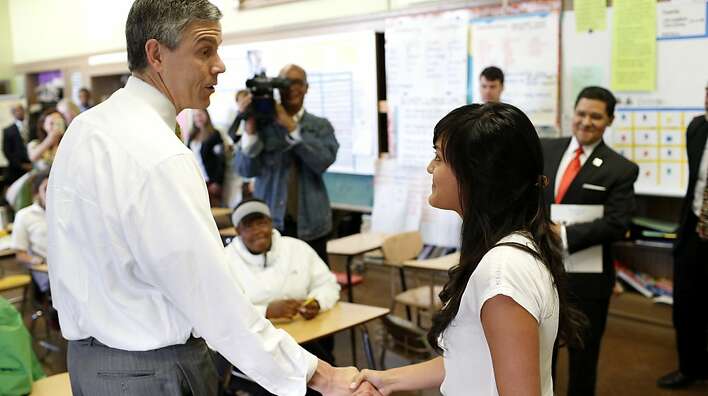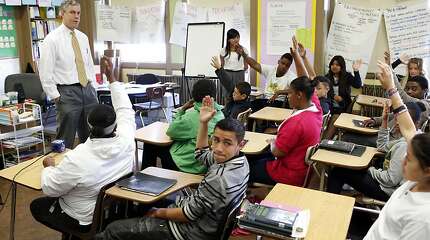
Beck Diefenbach, Special To The Chronicle
8th grade english teacher Kate Florita (right) shakes hands with U.S. Secretary of Education Arne Duncan.
May 3, 2013
Principals from other city schools that also got about $5 million in federal School Improvement Grants also cited improved student test scores, reduced suspensions, increased graduation rates and other successes they attributed to the cash.
But along with the proud public officials, the elephant in the room was a question without a good answer: What happens now?
Everett was one of nine schools in the district that received federal grants lasting three years.
The extra money, which runs out this year, bought counselors, summer school, tutors, parent liaisons, literacy experts, teacher training, nurses, technology, after-school programs and more, the principals said.
District officials said they will find funding to keep what they felt was most effective, including classroom coaches to help teachers.
Still, a lot of the positions and programs funded by the federal grants will go away.
"The money does matter," said Christopher Rosenberg, John Muir Elementary principal.

Beck Diefenbach, Special To The Chronicle
Everett Middle School eighth-graders respond to Duncan's questions about their college hopes and ambitions.
San Francisco schools that received the federal grants got an average of $4,000 more per student for three years.
Duncan said he and President Obama are pushing for more money to sustain the successful efforts seen in the schools receiving grants.
And if Congress says no?
"I don't hear anyone here (in San Francisco) making excuses," he said. "That work is not going to stop."
At Everett on Thursday, eighth-grade students told Duncan that when they started sixth grade, they were afraid to attend the Mission District school. There were a lot of fights and few families wanted to send their children there.

Beck Diefenbach, Special To The Chronicle
U.S. Secretary of Education Arne Duncan
(in white shirt) engages with S.F. principals, parents and officials at
Everett Middle School.
"That's a huge change - a huge change," Duncan said, smiling.
Time will tell whether the money bought long-lasting change.
In the grant schools, there are specially trained teachers, sparkling libraries and new computer labs. There are consistent procedures in place in terms of student discipline and identifying academically struggling students.
And the grants allowed schools to have enough financial freedom to see what kinds of programs or staff would make the most difference for their students, city education officials said.
That means going forward, they can get the most return on local, state or federal investment of taxpayer dollars, Duncan said.
"Resources matter," Duncan said. "But what matters as much if not more is courage."
While some educators might dispute that, those in San Francisco acknowledged that they don't have much of a choice.
"We had kids coming to our school before SIG and kids coming to our school after SIG," Rosenberg said, referring to the grant.
Duncan urged the two dozen San Francisco principals, teachers and administrators to share their success stories to persuade Congress to keep the money flowing.
"There are people who want to cut funding, who don't believe you can turn around schools," Duncan said. "Think about how you can tell these kinds of stories. They are not miracles."
Read more: http://www.sfchronicle.com/education/article/Education-chief-sees-results-of-extra-funds-4484175.php#ixzz2SG8LRO19